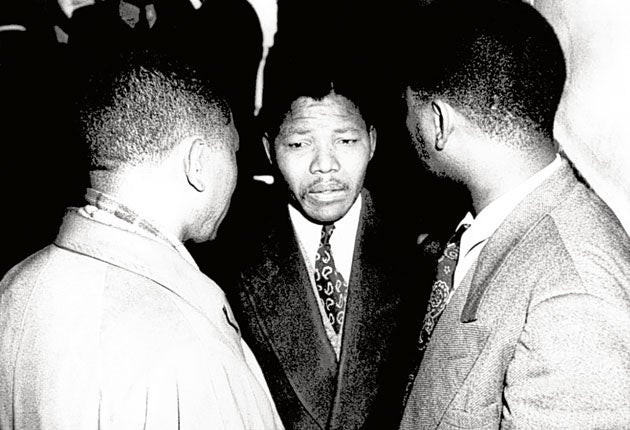Conversations With Myself, By Nelson Mandela
Talking about regeneration

Your support helps us to tell the story
From reproductive rights to climate change to Big Tech, The Independent is on the ground when the story is developing. Whether it's investigating the financials of Elon Musk's pro-Trump PAC or producing our latest documentary, 'The A Word', which shines a light on the American women fighting for reproductive rights, we know how important it is to parse out the facts from the messaging.
At such a critical moment in US history, we need reporters on the ground. Your donation allows us to keep sending journalists to speak to both sides of the story.
The Independent is trusted by Americans across the entire political spectrum. And unlike many other quality news outlets, we choose not to lock Americans out of our reporting and analysis with paywalls. We believe quality journalism should be available to everyone, paid for by those who can afford it.
Your support makes all the difference.Should Nelson Mandela be beatified, elevated to St Nelson, or St Madiba as he would probably prefer (posthumously of course)? There are plenty of people who believe he is worthy, certainly worthier than Cardinal Newman and a great deal worthier than the six nonentities proclaimed by the pope just a few weeks ago. Mandela, as you would expect of a prospective saint, is dead against it. "I never was one," he said, before adding with his impish (or should one say impious?) humour, "even on the basis of an earthly definition of a saint as a sinner who keeps on trying".
Conversations with Myself was trailed as the book which would finally lay to rest any notion of Mandela as saint, while leaving intact his position as a great human being seen for the first time through his unpublished writings, jottings and intimate fireside chats: the remaining bits and pieces from his private papers which have not found their way into the dozens of books about him.
Mandela will one day rival Napoleon, Churchill and Jesus Christ as the subject of most biographies. The cynical reaction to this book was that it was another wheeze for his archivists and publishers to make a few bob out of him before he finally shuffles off this mortal coil. It turns out to be much more than that, and may even prove invaluable for a pope centuries from now deciding between genuine saints and mere mortals.
In truth, as Mandela has tried vainly to protest, he is not very good saintly material. Before he went to prison, he was a legendary womaniser, particularly after he was married. He shamefully neglected his children, may or may not have beaten his wife (he denies the rumours, saying she attacked him with a red-hot poker), was vain, selfish and a self-proclaimed terrorist who founded the military wing of the ANC to pursue by arms what he believed at the time could not be achieved by peaceful means. He was no Gandhi, certainly no Francis of Assisi – and never claimed to be. Above all – and this may be the clincher – he went to a Wesleyan school.
But for all that, he may be the nearest thing to a saint we've got. One of the biggest complaints of his friends and family, infuriated by his naivety and innocence when dealing with seriously bad people, is that "he is too willing to see the good in other people". He admits that this has been said about him "from my adolescence". And if suffering and good deeds do it, then St Nelson it is. What other saint has ever saved an entire nation from a bloodbath? And how many have emerged from 27 years in prison to embrace his jailors without bitterness?
He bore his burden without complaint, was prepared to die for his beliefs; he turned the other cheek, forgave those who wronged him, displayed true heroism, courage and generosity of spirit and even delivered the miracle that was the Rainbow Nation. What did Cardinal Newman ever do?
The big flaw in Conversations is that it is not what the label says. There is a foreword from President Obama which adds or subtracts nothing to our insight into the man. Mandela, we are told, was informed of what was happening but "indicated his wish not to be involved personally", which is just as well. The great man is 92 and his faculties have been declining for some years. For some time has been wheeled on and off stages and given fixed texts to read without having any real idea of where he is or why he is there. The conversations referred to are with his ghost-writer Richard Stengel and his old friend Ahmet Kathrada, and were mostly recorded 20 years ago. They could not be held today.
Fortunately, there are nuggets enough to make publication a welcome and worthwhile event. Many of Mandela's letters to Winnie, his children and friends were intercepted and kept by the prison authorities. Here we read them for the first time, and they are very poignant and personal. He tells of his decision to open up negotiations with PW Botha in 1985 without telling the ANC leadership who would have been horrified and killed them stone dead. He records his doubts about becoming president aged 76, believing he was not up to the job (and he was right). Above all, it is an absorbing read both for ardent Mandelaphiles or the uninitiated alike. I hope they have put a copy in the Vatican archives.
Join our commenting forum
Join thought-provoking conversations, follow other Independent readers and see their replies
Comments